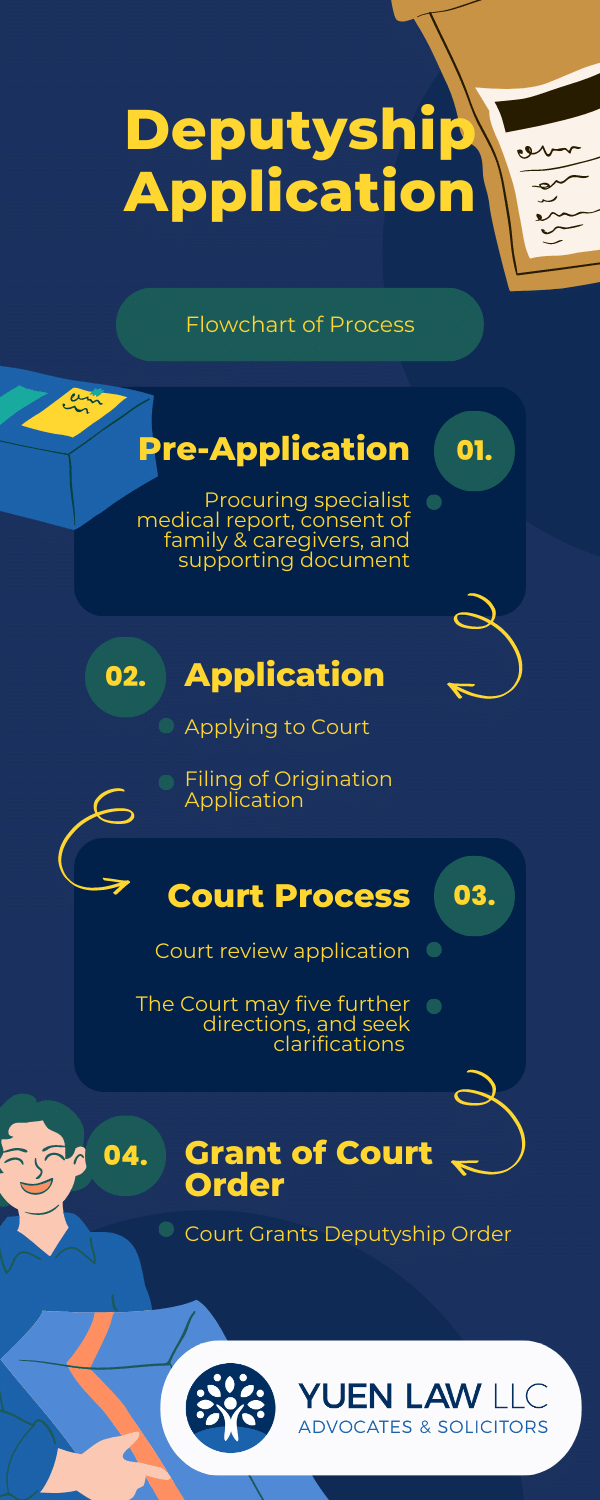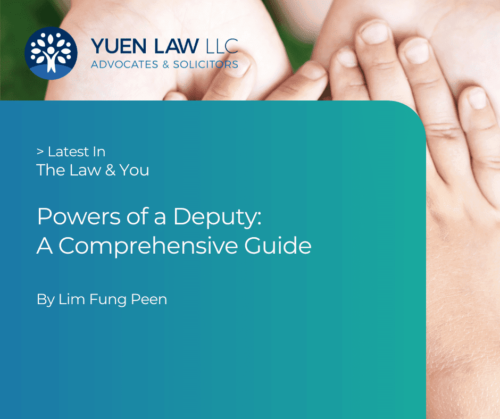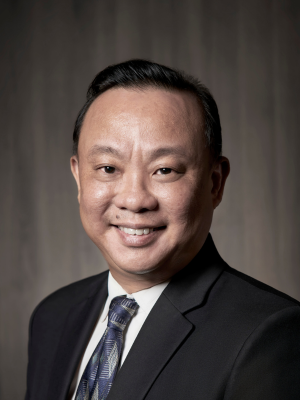
Meaning of Deputyship
Deputyship is when the Court grants an order to appoint someone known as a “deputy” under the Mental Capacity Act (MCA) to make decisions for the benefit and welfare of someone who lacks mental capacity.
The person who lacks mental capacity is referred to as a “patient” under the MCA and by the Singapore Court.
Definition of Mental Incapacity
Loss of mental capacity here is defined as the patient having lost the ability to understand information pertaining to making decisions, retaining or remembering such information, evaluating the information as part of the decision-making process, and communicating that decision either orally, verbally, or visually.
Section 4(1) of the MCA states that “a person lacks capacity in relation to a matter if at the material time the person is unable to make a decision for himself or herself in relation to the matter because of an impairment of, or a disturbance in the functioning of, the mind or brain.”
Not surprisingly, the court relies on a medical doctor’s affidavit on the opinion of the mental capacity of the patient, made within 6 months from time of application. This doctor must be a relevant specialist and not a general practitioner.
Difference between Lasting Power of Attorney (LPA) and Deputyship
Lasting Power of Attorney
A Lasting Power of Attorney (LPA) , is a legal document registered with the Office of the Public Guardian that empowers an individual to designate trusted individuals who will act on their behalf if they were to lose mental capacity. This document must be created by the person, known as the donor, before any mental capacity is lost. The appointed individuals, known as donees are entrusted with making decisions in the best interests of the donor, ensuring their affairs are handled appropriately.
Court Appointed Deputy
If a patient loses mental capacity without having made an LPA beforehand, only the Court can grant a deputyship order to appoint a representative who can make decisions on behalf of the person lacking capacity. In such cases, the patient’s family members or caregivers can apply to the Court to seek the order. Alternatively, if the patient does not have any suitable next of kin or if their next of kin is unable to fulfill the role, Professional Deputies have the option to apply and be appointed as their Deputies.
The Role of a Deputy
The Deputy is usually a close relative or loved one. The Deputy is responsible for managing Patient’s affairs, making decisions about Patient’s healthcare and welfare matters, and managing their property and financial affairs. The Deputy will need to act in the best interests of Patient at all times.
One of the responsibilities of a Deputy is to submit annual Deputy Reports to the Ministry of Social and Family Development’s Office of the Public Guardian, to explain all the decisions the Deputy has made for Patient that year, and how the Deputy had utilized Patient’s monies for Patient’s benefit. This would mean that the Deputy will need to keep a record of all decisions made for Patient, and the reasons for those decisions. This includes keeping a record of statements, vouchers, receipts, and other financial records related to Patient’s property and affairs.
Can anyone apply to be the Deputy?
The short answer, is no. Only Relevant persons can.
Relevant persons are persons who have an involvement in Patient’s life, and/or who are likely to have an interest in the application. Often, Patient’s immediately family members, by virtue of their relationship to Patient, are likely to have an interest in being notified at an application has been made to the Court concerning Patient. Under Rule 176A and 179 of the Family Justice Rules, immediate family members include Patient’s spouse, Patient’s siblings and children (above 21 years old) and Patient’s parents or guardians.
Apart from immediate family members, other relevant persons who are likely to have an interest in the application concerning Patient, and thus who should be served the application, supporting affidavits, and the Notice to Relevant Person in Form 222 include any persons who have a legal duty to support Patient, any other relatives or friends who have a close relationship with Patient, any person who will benefit from Patient’s estate, and any person who is responsible for Patient’s care.
If there is no such person to the best of the Plaintiff (i.e. the applicant)’s knowledge, he will need to state this in his supporting affidavit.
Can we appoint more than one Deputy?
Yes, there is no limit to the number of applicants applying to be Patient’s Deputy(ies).
However, applicants should also consider some of the implications that may arise if there is more than one Deputy. We have had cases where the two appointed deputies could not attend to financial institution matters (e.g. banks for the opening / closure of P’s bank accounts) together due to their work schedules. As both deputies are appointed by the Court, both are required to be present when handling P’s matters.
Under Section 24(5), the Court may also, at the same time, appoint one or more other persons to succeed the deputy. This is called a successor deputy. In layman terms, it’s a replacement deputy, in the event the appointed deputy predeceases Patient is unable to act (i.e. no mental capacity).
Preparing for a Deputyship Application
The first requirement is to obtain a specialist medical report (e.g., from a neurologist or psychiatrist) that certifies that the patient lacks mental capacity. The report should satisfy the following requirements: –
- Distinguish clearly between observations or conclusions based on information given to the doctor and those that are based on the doctor’s examination of the patient;
- Contain a clear opinion as to whether the patient lacks capacity in relation to the matters specified in your application;
- Contain a clear opinion on patient’s prognosis; and
- Be current and within 6 months from the date of your application.
You need to apply for this through the medical records office of the hospital or clinic or nursing home in which the patient frequents. From our experience, the specialist medical report from government hospitals costs around $500.
Depending on the hospitals, they may also require the applicant to provide them with a lawyer’s letter for the request as well. We will be able to assist you on this.
How to Apply for the Deputyship Application in Singapore
Simplified Deputyship Applications Involving Withdrawal of Money Up To $80,000
Applications for deputyship court orders that involve the withdrawal of funds up to $80,000 are eligible for the simplified filing track. View the list of orders you can apply for under this simplified track.
Applications for urgent short-term orders limited to $5,000, or long-term orders up to $80,000 can be submitted online via the Family Justice Courts’ Integrated Family Application Management System (iFAMS) using SingPass. If the Patient require more monies in future, a subsequent application can be made.
Standard Deputyship Applications Involving Withdrawal of Money Above $80,000
Yuen Law has an abiding interest in family law matters and has vast experience with deputyship applications. We advise families on how to better prepare for the deputyship application to Court, and what the Court wishes to know in order to grant an order under the MCA, this includes:
- Who the immediate family members and primary caregivers of the patient are;
- Who the deputy will be;
- Health care and living arrangement of the patient;
- What the expected expenses of the patient are, and how long can the patient’s funds last;
- Whether there is a need to apply for other relevant powers for the patient based on the patient’s circumstances (for example, powers relating to transfer of funds from bank account, making insurance claims, selling or renting the patient’s house).
Knowing the court requirements will save valuable time and ensure a smoother application process. In our guide, “How to be Appointed a Deputy”, we detail the necessary documents for the court application and what to expect after filing.

One critical thing you need to secure is the unanimous agreement of immediate family members in applying for deputyship as well as the choice of the prospective deputy. If such an agreement cannot be reached, one may find the deputyship application challenged in court. This instantly complicates the deputyship application process, and the application costs might increase very quickly, as the case will come become a contested.
The timeline for a deputyship application depends on the application complexity and the preparation of the prospective deputy. Do plan for at least 6 months to the grant of the deputyship order under the MCA.
Frequently Asked Questions
Does the Deputyship Court Order extend to jurisdictions outside of Singapore?
No, the Court Order does not extend to jurisdictions outside of Singapore. If the Patient has assets outside of Singapore, Patient’s immediate family members should speak with a lawyer located in that jurisdiction to inquire on how they can go about managing Patient’s affairs in that jurisdiction.
What if the patient is not Singaporean or is based overseas, but has affairs and assets in Singapore?
If the patient is based overseas, a Deputyship application must still be initiated in Singapore for the Deputy to manage the patient’s affairs and assets within Singapore.
As mentioned earlier, the first requirement is to obtain a specialist medical report that meets certain criteria. If the patient is treated overseas, they can submit a medical report from that foreign country. However, the report must still comply with the format and rules of the Singapore Courts.
Can Deputyship Applications be contested?
Yes, Deputyship applications can be contested. The common scenarios include:
- Two siblings arguing on who is the best person to apply;
- Revocation of existing Court Order, where another family member is looking to apply to be the new Deputy to manage Patient’s affairs.
Every case is different. If you are keen to discuss further, please do not hesitate to reach out to us at inquiry@yuenlaw.com.sg.
How can parents in Singapore apply for deputyship for special needs children turning 21 under the Assisted Deputyship Programme (ADAP)?
If your child is aged 18 to 21 and is part of a graduating cohort at a special education school, or enrolled in a Ministry of Social and Family Development activity center or sheltered workshop, you may be eligible to apply for a simplified deputyship under the Assisted Deputyship Programme (ADAP).
ADAP is designed to make it easier and more affordable for parents or caregivers of children with special needs to apply to the Court to be appointed as deputies. This ensures parents or caregivers can continue making legal decisions for their child even after they turn 21.
For more details about ADAP, visit the Enabling Guide.
Our Commitment to Transparent Pricing
For deputyships involving withdrawals up to $80,000 and qualify for the simplified deputyship application, families can apply directly on the Family Justice Courts’ Integrated Family Application Management System (iFAMS) using SingPass.
For deputyships involving withdrawals above $80,000, families will need to proceed with the standard deputyship application, we offer a complimentary discovery meeting to understand the family’s situation and the powers required. During this meeting, we will discuss the scope of work and provide a detailed quote, ensuring you have complete clarity on the fees and process.
Yuen Law has been consistently recognised as one of Singapore’s Best Law Firm for 3 consecutive years by The Straits Times in Family Law. It is also recommended by Benchmark Litigation for its work in Family and Matrimonial matters.
Our Private Wealth & Family Practice is headed by veteran lawyer Lim Fung Peen, who specialises in Deputyship Applications. Fung Peen is dedicated to offering compassionate guidance on Deputyship Applications to Court. Do contact us for further assistance.


















